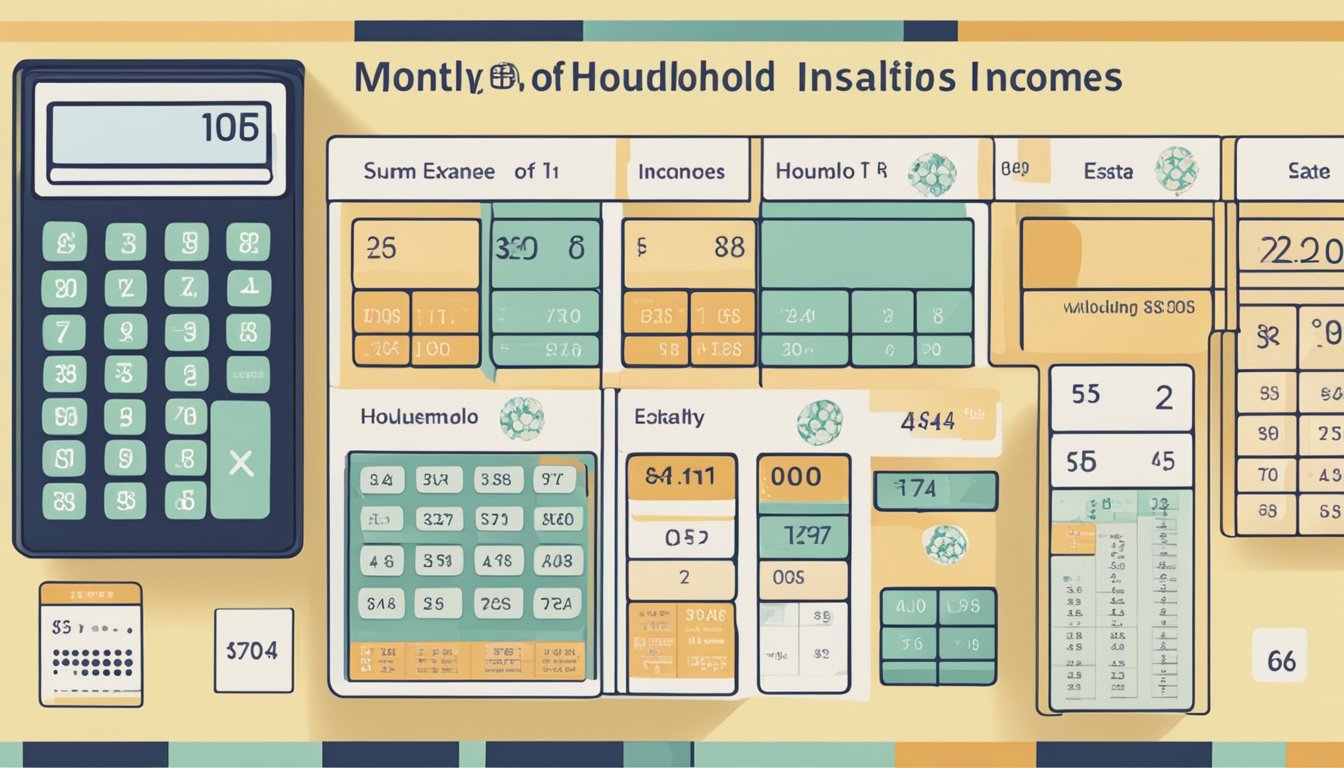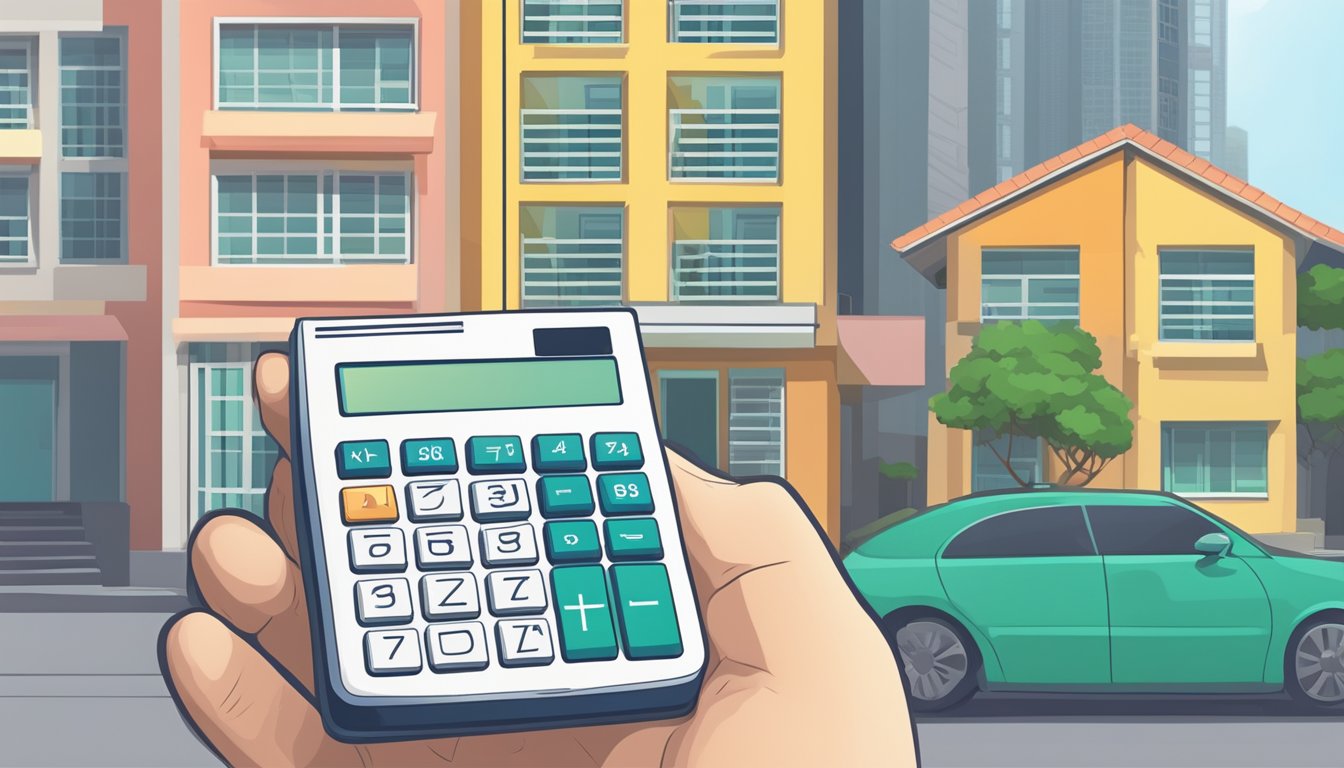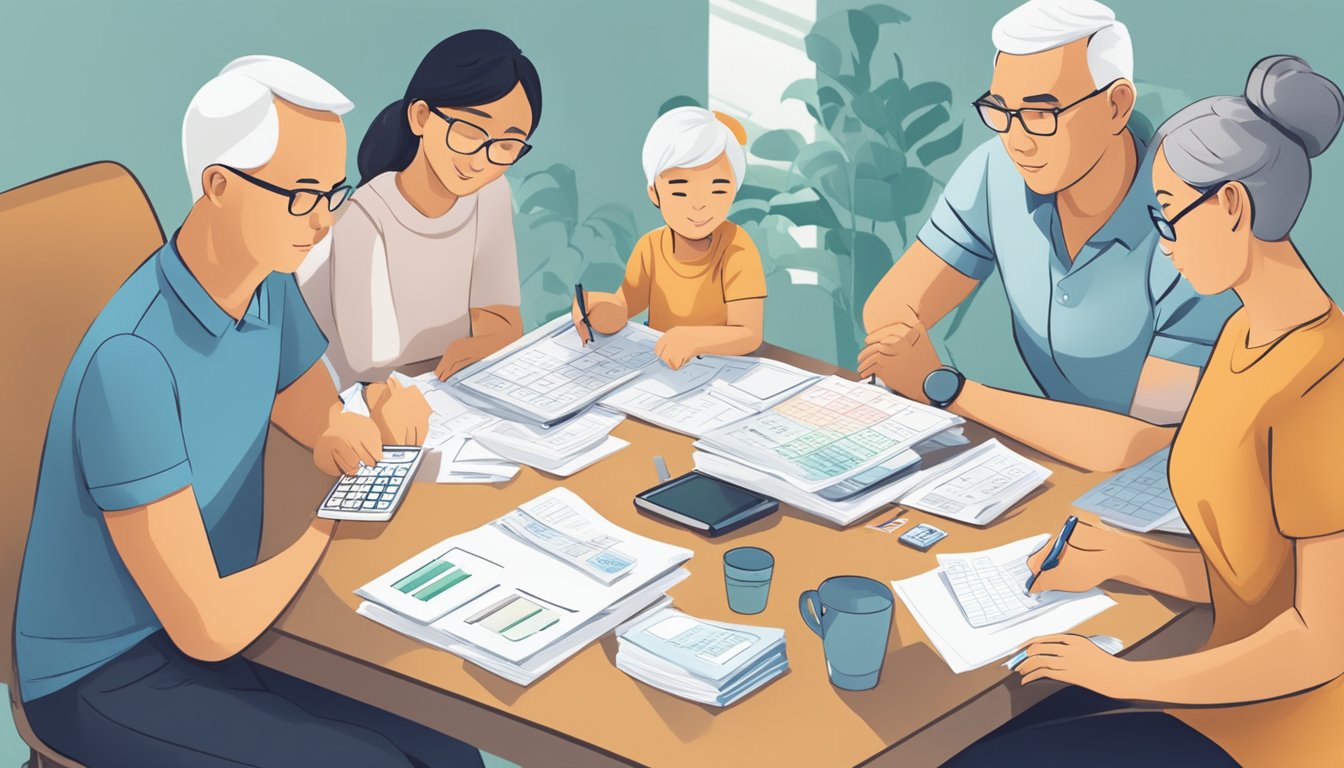Calculating your average gross monthly household income is a crucial step in determining your eligibility for an HDB flat in Singapore. It is important to understand the guidelines set forth by HDB and accurately calculate your income to ensure a smooth application process. In this article, we will guide you through the steps to calculate your average gross monthly household income and provide valuable information on HDB income guidelines, housing grants, and financing options.

To begin, it is important to understand that the income ceiling for HDB flats varies depending on the type of flat and the location. The income ceiling is the maximum amount of income a household can earn to be eligible for an HDB flat. The income ceiling is reviewed periodically to ensure that it remains relevant to the current economic climate. Understanding the income guidelines set forth by HDB is essential to determine your eligibility for an HDB flat.
Once you have a clear understanding of the HDB income guidelines, you can proceed to calculate your average gross monthly household income. This involves calculating the total gross income for each household member and dividing it by the specified time period (usually 3-6 months) depending on the type of income earned. It is important to accurately calculate your income to ensure that you meet the income ceiling for your desired HDB flat.
Understanding HDB Income Guidelines

If you are planning to apply for an HDB flat in Singapore, it is important to understand the HDB income guidelines. The HDB has strict eligibility criteria that you must meet to be considered for a flat. In this section, we will discuss the income ceiling and assessment period for income.
Income Ceiling and Eligibility
To be eligible for an HDB flat, your gross monthly household income must not exceed the monthly household income ceiling. The income ceiling varies based on the type of flat you are applying for and the location of the flat. For example, the income ceiling for a 2-room flexi flat in non-mature estates is $7,000, while the income ceiling for a 5-room or larger flat in mature estates is $21,000.
It is important to note that the income ceiling is reviewed periodically and may change over time. You should always check the latest income ceiling before submitting your application.
Assessment Period for Income
The assessment period for income is the period during which your household income is assessed to determine your eligibility for an HDB flat. The assessment period is typically 12 months, but it may be shorter if you have taken no-pay leave or have had a change in employment.
During the assessment period, all types of income and allowances are considered for assessment of household income and credit assessment. These include your basic salary, allowances, bonuses, overtime pay, and rental income. However, certain types of income, such as income from part-time jobs, may be subject to a cap.
In summary, understanding the HDB income guidelines is crucial when applying for an HDB flat in Singapore. Make sure you check the latest income ceiling and understand the assessment period for income to increase your chances of being eligible for a flat.
Calculating Your Household Income

Calculating your average gross monthly household income is an essential step when applying for an HDB flat in Singapore. The income ceiling varies based on the type of flat and the number of household members. Here’s how you can calculate your household income:
Components of Gross Monthly Income
Gross monthly income refers to the total income earned before any deductions are made. It includes basic salary, overtime pay, and any other allowances or bonuses received. To calculate your gross monthly income, add up the following components:
- Basic salary: This is the fixed amount you receive each month for your employment.
- Overtime pay: If you work overtime, the additional pay you receive should be included in your gross monthly income.
- Allowances: Any additional payments you receive, such as transport or meal allowances, should be included.
- Bonuses: If you receive any bonuses, such as performance or year-end bonuses, they should be included in your gross monthly income.
Including Bonuses and Allowances
When calculating your gross monthly income, it’s important to include all bonuses and allowances received. These payments can significantly increase your income and help you meet the income ceiling requirements.
To include bonuses and allowances in your gross monthly income, add up the total amount received over the past three to six months, depending on the type of income earned. Divide the total by the number of months included to determine the average amount received per month.
Conclusion
Calculating your average gross monthly household income is an essential step when applying for an HDB flat in Singapore. By including all components of your income, such as basic salary, overtime pay, allowances, and bonuses, you can accurately determine your gross monthly income and ensure that you meet the income ceiling requirements.
HDB Housing Grants and Financial Assistance

If you are a first-time homeowner in Singapore, you may be eligible for various HDB housing grants and financial assistance schemes. These grants and schemes can help you to purchase your dream home and make it more affordable for you.
CPF Housing Grants
One of the most common types of housing grants available in Singapore is the CPF Housing Grant. This grant is available to first-time homeowners who are buying a new or resale HDB flat. The amount of the grant depends on your income and the type of flat you are buying.
The CPF Housing Grant is divided into two categories: Family Grant and Singles Grant. Family Grant is available to married or engaged couples, while Singles Grant is available to singles. The amount of the grant varies depending on your income and the type of flat you are buying.
Additional Grants and Eligibility
In addition to CPF Housing Grants, there are other types of grants and financial assistance available for first-time homeowners in Singapore. These include Enhanced CPF Housing Grant (EHG) and Proximity Housing Grant.
EHG is a grant that provides additional financial assistance to first-time homeowners who are buying a new or resale HDB flat. The grant amount depends on your income and the type of flat you are buying. To be eligible for EHG, you must meet certain income and eligibility conditions.
Proximity Housing Grant is a grant that provides financial assistance to first-time homeowners who are buying a resale flat near their parents or married child. The grant amount is $20,000. To be eligible for Proximity Housing Grant, you must meet certain eligibility conditions.
To be eligible for any of these grants and financial assistance schemes, you must meet certain eligibility conditions. These conditions include income, citizenship, age, and family nucleus. You can find more information on the eligibility conditions on the HDB website.
In conclusion, if you are a first-time homeowner in Singapore, there are various HDB housing grants and financial assistance schemes available to help you purchase your dream home. These grants and schemes can make your home purchase more affordable and help you achieve your homeownership dreams.
Application Process for HDB Flats

If you are planning to purchase an HDB flat, the first step is to check your eligibility. One of the eligibility criteria is that your average gross monthly household income must not exceed a certain amount. In this section, we will explain the application process for HDB flats and the required documents for income verification.
Required Documents for Income Verification
To verify your income, you will need to submit supporting documents such as your payslips, income tax statements, and CPF contribution statements. The documents required may vary depending on your employment status. For example, if you are self-employed, you will need to submit your income tax statements and your business registration documents.
HDB Flat Application and Buying Procedure
Once you have checked your eligibility and verified your income, you can proceed with the HDB flat application process. The buying procedure for new flats is as follows:
- Check the HDB Flat Portal for the latest sales launches.
- Attend the sales launch and select your preferred flat.
- Submit your application online or in person at the HDB Hub.
- Wait for the results of your application.
If your application is successful, you will be invited to sign the Agreement for Lease and pay the option fee. After that, you will need to pay the downpayment and sign the Lease Agreement.
In summary, to calculate your average gross monthly household income for an HDB flat, you need to divide your total income by the number of months you have worked. To apply for an HDB flat, you need to check your eligibility, verify your income, and follow the buying procedure for new flats. Make sure to prepare the required documents for income verification to avoid any delays in the application process.
Special Considerations for Different Family Types

When calculating your average gross monthly household income for HDB in Singapore, there are some special considerations to keep in mind depending on your family type. Here are some important things to consider:
Calculating Income for Self-Employed
If you are self-employed, calculating your income can be a bit more complicated. You will need to provide your Notice of Assessment (NOA) from the Inland Revenue Authority of Singapore (IRAS) for the past 2 years. Your average gross monthly income will be calculated based on your net trade income as shown on your NOA.
Inclusion of Pension and Rental Income
If you or any family member in your household receives pension or rental income, you will need to include it in your calculation of average gross monthly household income. Pension income can include payouts from the Central Provident Fund (CPF) or other retirement schemes. Rental income can include income from renting out property or rooms in your HDB flat.
When including pension or rental income, be sure to include the full amount received in the past 3-6 months, depending on the type of income earned. If the income is irregular or fluctuates, you will need to take an average over a longer period of time to get an accurate picture of your income.
Marriage and Family Nucleus
If you are married, you will need to calculate your average gross monthly household income based on the combined income of you and your spouse. This is because HDB considers you and your spouse as a family nucleus when applying for an HDB flat.
If you have children or other family members living with you, you will also need to include their income in your calculation of average gross monthly household income. This is because HDB considers all members of a family nucleus when determining eligibility for HDB flats.
By taking these special considerations into account, you can ensure that your calculation of average gross monthly household income for HDB in Singapore is accurate and complete.
Financing and Loan Options for HDB Flats

If you’re planning to purchase an HDB flat, financing and loan options are essential to consider. In this section, we’ll explore two key options for financing your HDB flat: HDB Housing Loan Eligibility and Private Financing and Credit Assessment.
HDB Housing Loan Eligibility
The HDB Housing Loan is a popular option for financing your HDB flat. To be eligible, you must meet the following criteria:
- Have a gross monthly household income of up to $14,000 for families and $7,000 for singles.
- Be a Singapore Citizen or Permanent Resident.
- Have not owned more than one HDB flat or private residential property.
- Have not disposed of any private residential property within the past 30 months.
- Have not received more than two HDB housing loans.
If you meet these criteria, you can apply for an HDB Housing Loan by submitting an HDB Loan Eligibility (HLE) letter application. This letter will provide you with an estimate of the loan amount you’re eligible for based on your income and financial situation.
Private Financing and Credit Assessment
If you’re not eligible for an HDB Housing Loan or want to explore other financing options, private financing may be an option. Private financing involves obtaining a loan from a bank or financial institution.
Before applying for a private loan, it’s important to assess your credit score and financial situation to determine your eligibility and the loan amount you can afford. You can obtain a credit report from the Credit Bureau Singapore to assess your credit score.
It’s also important to consider the minimum occupation period (MOP) of your HDB flat. The MOP is the minimum period you must occupy your HDB flat before you can sell or rent it out. The MOP is typically five years for new flats and three years for resale flats.
In summary, financing and loan options are crucial to consider when purchasing an HDB flat. The HDB Housing Loan is a popular option, but private financing may also be an option to explore. Assessing your credit score, financial situation, and the minimum occupation period of your HDB flat are important factors to consider when exploring financing options.
Frequently Asked Questions
What’s the formula for working out average gross monthly income for a Singapore household?
Calculating the average gross monthly income for a Singapore household is easy. You need to add up the total gross income for each household member and divide it by the number of months worked. For example, if you have two household members and their total gross income for three months is $6,000, then the average gross monthly income would be $2,000.
Could you tell me if bonuses are factored into the gross monthly household income for HDB?
Yes, bonuses are factored into the gross monthly household income for HDB. Any additional income, including bonuses, is included in the calculation of gross monthly household income.
What methods are there to determine the income ceiling when eyeing an HDB resale flat?
There are several methods to determine the income ceiling when eyeing an HDB resale flat. One way is to check the latest income guidelines published by HDB. Another way is to use HDB’s online calculator to determine the maximum amount of income you can earn to be eligible for an HDB flat.
How thrilling! Can you explain how the HDB’s income assessment works?
HDB’s income assessment is based on the total gross income earned by all household members. The income assessment takes into account the type of income earned, such as salaries, bonuses, and allowances. HDB also considers the duration of employment and any periods of no-pay leave.
What’s included in the gross monthly income calculation by HDB?
The gross monthly income calculation by HDB includes all sources of income, such as salaries, bonuses, allowances, and overtime pay. HDB also takes into account the duration of employment and any periods of no-pay leave.
In what way does one obtain an income letter for HDB applications?
To obtain an income letter for HDB applications, you need to submit your income documents to HDB. This includes your latest payslips, CPF contribution statements, and tax assessment notices. HDB will then verify your income and issue an income letter, which you can use for your HDB application.




